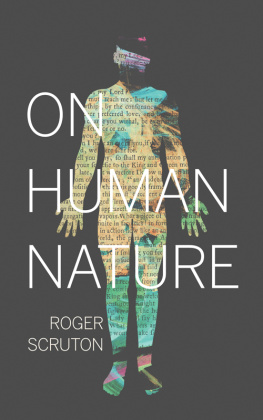Scruton - The face of God : the Gifford lectures 2010
Here you can read online Scruton - The face of God : the Gifford lectures 2010 full text of the book (entire story) in english for free. Download pdf and epub, get meaning, cover and reviews about this ebook. year: 2012, publisher: Bloomsbury Academic;Continuum, genre: Religion. Description of the work, (preface) as well as reviews are available. Best literature library LitArk.com created for fans of good reading and offers a wide selection of genres:
Romance novel
Science fiction
Adventure
Detective
Science
History
Home and family
Prose
Art
Politics
Computer
Non-fiction
Religion
Business
Children
Humor
Choose a favorite category and find really read worthwhile books. Enjoy immersion in the world of imagination, feel the emotions of the characters or learn something new for yourself, make an fascinating discovery.
The face of God : the Gifford lectures 2010: summary, description and annotation
We offer to read an annotation, description, summary or preface (depends on what the author of the book "The face of God : the Gifford lectures 2010" wrote himself). If you haven't found the necessary information about the book — write in the comments, we will try to find it.
>
Scruton: author's other books
Who wrote The face of God : the Gifford lectures 2010? Find out the surname, the name of the author of the book and a list of all author's works by series.
The face of God : the Gifford lectures 2010 — read online for free the complete book (whole text) full work
Below is the text of the book, divided by pages. System saving the place of the last page read, allows you to conveniently read the book "The face of God : the Gifford lectures 2010" online for free, without having to search again every time where you left off. Put a bookmark, and you can go to the page where you finished reading at any time.
Font size:
Interval:
Bookmark:
The Face of God
The Gifford Lectures 2010
ROGER SCRUTON

Bloomsbury Academic
An imprint of Bloomsbury Publishing Plc
50 Bedford Square | 1385 Broadway |
London | New York |
WC1B 3DP | NY 10018 |
UK | USA |
www.bloomsbury.com
Bloomsbury is a registered trade mark of Bloomsbury Publishing Plc
Roger Scruton, 2012
Roger Scruton has asserted his right under the Copyright,
Designs and Patents Act, 1988, to be identified as Author of this work.
All rights reserved. No part of this publication may be reproduced or transmitted in any form or by any means, electronic or mechanical, including photocopying, recording, or any information storage or retrieval system, without prior permission in writing from the publishers.
No responsibility for loss caused to any individual or organization acting on or refraining from action as a result of the material in this publication can be accepted by Bloomsbury or the author.
British Library Cataloguing-in-Publication Data
A catalogue record for this book is available from the British Library.
ISBN: HB: 978-1-8470-6524-7
PB: 978-1-4729-1273-2
ePUB: 978-0-8264-3207-0
ePDF: 978-1-4411-4063-0
Library of Congress Cataloging-in-Publication Data
A catalog record for this book is available from the Library of Congress
Contents
| From The Expression of the Emotions in Man and Animals, by Charles Darwin: three illustrations of aggression and anger |
| Self Portrait by Rembrandt van Rijn |
| The Artists Mother by Rembrandt van Rijn |
| Eros and Psyche by Antonio Canova |
| Woman with Mask and Pomegranate by Lorenzo Lippi |
| Susanna and the Elders by Rembrandt van Rijn |
| Brigand Stripping Woman by Francisco Goya |
| Expulsion from Paradise by Masaccio |
| Detail of Smiling Angel, Reims Cathedral |
| Detail of Ecstasy of Saint Teresa by Gian Lorenzo Bernini |
| Detail of Birth of Venus by Sandro Botticelli |
| Detail of Birth of Venus by William Bouguereau |
| Detail of Federal Hall, New York (Pierre Charles LEnfant) |
| A street in Whitby, Yorkshire |
| Sunset Boulevard, Los Angeles |
| A canal in Venice |
| Detail of Wanderer Above a Sea of Fog by Caspar David Friedrich |
| Uniri Square, Bucharest |
| The Adoration of the Golden Calf by Nicolas Poussin |
| Cooper Square, New York by Morphosis |
This book contains the published version of the Gifford Lectures delivered in the University of St Andrews during the Spring of 2010. Lord Giffords bequest was to sponsor public lectures in the Scottish Universities that would promote and diffuse the knowledge of God. And he hoped that the lectures would be accessible without specialist expertise. I have therefore tried to avoid the technical details that academic philosophers might think to be essential to the proper development of my argument, and I have passed quickly over debates that seem to me to be marginal to the concerns of ordinary educated people.
I am grateful to the University of St Andrews for inviting me to give these lectures, and to the lively audiences who made it such a pleasure to deliver them. I am particularly grateful to Professor John Haldane of the department of philosophy, who took a leading part both in securing the invitation and in ensuring that it would be such a rewarding and pleasurable experience to accept it.
In preparing these lectures for publication I have filled in some of the arguments, but tried to maintain the relatively informal style in which they were first composed. Here and there I have added footnotes that will guide the interested reader to discussions that I have judged to be too specialized or intricate to deserve a place in the text. Previous versions have been read by John Cottingham, Fiona Ellis, Alicja Gciska and Raymond Tallis, and I am grateful to them for their comments and criticisms.
Malmesbury, June 2011
Lord Gifford was not an orthodox adherent of any religion, but someone who nevertheless believed that our relation to God is the most important relation we have. He lived among people who shared that belief, and he himself assumed that philosophy, psychology and anthropology would confirm it. I doubt that he anticipated the culture that prevails today, in which the belief in God is widely rejected as a sign of emotional and intellectual immaturity. But I think he would have endorsed the attempt to explore what we lose, when we lose that belief. And this will be one of my themes in what follows. I will be considering some of the consequences of the atheist culture that is growing around us: and I will suggest that it is not only an intellectual phenomenon, expressing a disbelief in God, but also a moral phenomenon, involving a turning away from God.
You might wonder how people can deliberately turn away from a thing that they believe not to exist. But God is in intimate relationship even with those who reject him. Like the spouse in a sacramental marriage, God is unavoidable, or avoidable only by creating a void. This void opens before us when we destroy the face not the human face only, but also the face of the world. The godless void is what confronts us, when our surroundings are defaced. I do not deny that atheists can be thoroughly upright people, far better people than I am. But there is more than one motive underlying the atheist culture of our times, and the desire to escape from the eye of judgement is one of them. You escape from the eye of judgement by wiping away the face.
I begin from the scientific worldview, which many people believe is the real source of current doubts about the belief in God. According to Richard Dawkins, the most prominent of the evangelical atheists today, human beings are survival machines in the service of their genes. We are by-products of a process that is entirely indifferent to our wellbeing, machines developed by our genetic material and adapted by natural selection to the task of propagation. Genes themselves are complex molecules, put together in accordance with the laws of chemistry, from material made available in the primeval soup that once boiled on the surface of our planet. How it happened is not yet known: maybe electrical discharges caused nitrogen, carbon, hydrogen and oxygen atoms to link together in appropriate chains, until one of these chains achieved the remarkable feature that we know as life, but which is better described as the encoding of instructions for its own reproduction. Science may one day be able to answer the question how this occurred. But it is science, not religion, that will answer the question.
As for the existence of a planet, in which the elements abound in the quantities in which they abound on planet Earth, such a thing is again to be explained by science though the science of astrophysics rather than the science of biology. The existence of the earth is part of a great unfolding process, set in motion by a Big Bang, which contains many mysteries that physicists explore with ever increasing astonishment. Astrophysics has raised as many questions as it has answered. But they are scientific questions, to be answered by discovering the laws of motion that govern the observable changes at every level of the physical world, from galaxy to quark, and from black hole to supernova. The mystery that confronts us as we gaze upwards at the Milky Way, knowing that the stars crystallized in that smear of light are merely stars of a single galaxy, the galaxy that contains us, and that beyond its boundaries a myriad other galaxies turn in space, some dying, some emerging, all forever inaccessible to us and all receding at unimaginable speed this mystery does not call for a religious response. For it is a mystery that results from our partial knowledge, and which can be solved only by further knowledge of the same kind the knowledge that we call science. Perhaps, if the Big Bang theory is correct, there was a moment when this all began. But what was true at that moment is in principle unknowable to us, the laws of physics operating only from the moment an infinitesimal fraction of a second later (so-called Planck time), when the spacetime continuum emerged. To the question how were things at the beginning? there is no intelligible answer; in which case maybe it is not an intelligible question. Indeed the concept of a
Next pageFont size:
Interval:
Bookmark:
Similar books «The face of God : the Gifford lectures 2010»
Look at similar books to The face of God : the Gifford lectures 2010. We have selected literature similar in name and meaning in the hope of providing readers with more options to find new, interesting, not yet read works.
Discussion, reviews of the book The face of God : the Gifford lectures 2010 and just readers' own opinions. Leave your comments, write what you think about the work, its meaning or the main characters. Specify what exactly you liked and what you didn't like, and why you think so.











